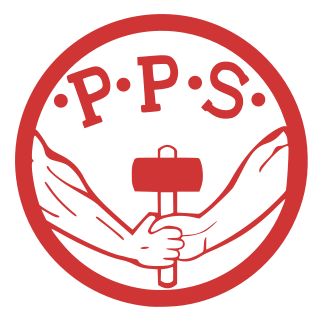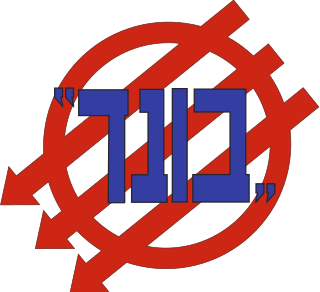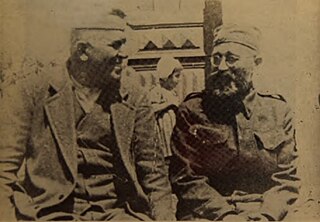Related Research Articles

The Communist International (Comintern), also known as the Third International, was an international organization founded in 1919 that advocated world communism, and which was led and controlled by the Communist Party of the Soviet Union. The Comintern resolved at its Second Congress in 1920 to "struggle by all available means, including armed force, for the overthrow of the international bourgeoisie and the creation of an international soviet republic as a transition stage to the complete abolition of the state". The Comintern was preceded by the dissolution of the Second International in 1916.
The interwar Communist Party of Poland was a communist party active in Poland during the Second Polish Republic. It resulted from a December 1918 merger of the Social Democracy of the Kingdom of Poland and Lithuania (SDKPiL) and the Polish Socialist Party – Left into the Communist Workers' Party of Poland. The communists were a small force in Polish politics.
The International Working Union of Socialist Parties was a political international for the co-operation of socialist parties.

The Polish Socialist Party is a socialist political party in Poland.
The Folkspartei was founded after the 1905 pogroms in the Russian Empire by Simon Dubnow and Israel Efrojkin. The party took part in several elections in Poland and Lithuania in the 1920s and 1930s and did not survive the Holocaust.

Związek Ludowo-Narodowy was a Polish political party aligned with the National Democracy political movement during the Second Polish Republic, gathering together right-wing politicians with conservative and nationalist opinions.

The Confédération générale du travail unitaire, or CGTU, was a trade union confederation in France that at first included anarcho-syndicalists and soon became aligned with the French Communist Party. It was founded in 1922 as a confederation of radical unions that had left the socialist-dominated General Confederation of Labour (CGT), and in 1936 merged back into the CGT.

Socialist Workers' Sport International was an international socialist sporting organisation, based in Lucerne. It was founded in 1920, and consisted of six national federations at the time of its foundation. Initially it was known as International Association for Sports and Physical Culture. Informally it was known as the Lucerne Sport International. It adopted the name SASI in 1926. The Austro-Marxist Julius Deutsch was the president of SASI.

United Jewish Socialist Workers Party was a political party that emerged in Russia in the wake of the 1917 February Revolution. Members of the party along with the Poalei Zion participated in the government of Ukraine and condemned the October Revolution.

The Social Democratic Bund, or the General Jewish Labour Bund, the Bund (S.D.) or, later, the "Bund" in the Soviet Union, was a short-lived Jewish political party in Soviet Russia. It was formed as the Russian Bund was split at its conference in Gomel in April 1920. The Social Democratic Bund was formed out of the right-wing minority section of the erstwhile Russian Bund. The party was led by Raphael Abramovitch. After 1923, it continued to exist in exile.

The "Bund" in Latvia was a Jewish socialist party in Latvia between the two World Wars, adhering to the political line of the General Jewish Labour Bund.

The General Jewish Labour Bund in Poland was a Jewish socialist party in Poland which promoted the political, cultural and social autonomy of Jewish workers, sought to combat antisemitism and was generally opposed to Zionism.

The General Jewish Labour Party was a Jewish socialist political party in Poland. The party was founded in Lviv in November 1931 by a leftwing group of the General Jewish Labour Bund in Poland in East Galicia, which upheld the idea of dictatorship of the proletariat, a faction of the Poale Zion Left and young left-wing Zionists. The party was aligned with the Communist Party of Poland. The party called for a workers' government, equality for Jewish working people, education in Yiddish language for Jewish children in state schools, abolition of discrimination in the labour market and to struggle against anti-semitism.
The Social Democratic Party of the Free City of Danzig was a political party in the Free City of Danzig. After the creation of the Free City of Danzig in 1919, the Danzig branch of the Social Democratic Party of Germany (SPD) separated itself from the party, and created the Social Democratic Party of the Free City of Danzig. The new party did however maintain close links with the SPD, and its political orientation was largely the same as that of the SPD.
The Socialist-Communist Union, later renamed the Socialist-Communist Party, was a socialist political party in France between 1923 and 1932.
Joseph Kruk was an Israeli journalist and a politician in pre-war Poland.

Živko Topalović was a Yugoslav socialist politician. Topalović became a leading figure in the Socialist Party of Yugoslavia, founded in 1921. During World War II he became a prominent member of Draža Mihailović's Chetniks.
The Young Communist League of Poland, in February 1930 renamed as the Communist League of Youth in Poland Polish: Komunistyczny Związek Młodzieży Polski, abbreviated KZMP), was the youth wing of the interbellum Communist Party of Poland between 1922 and 1938. ZMKwP/KZMP was a section of the Young Communist International.

Poale Zion was a movement of Marxist–Zionist Jewish workers founded in various cities of Poland, Europe and the Russian Empire at about the turn of the 20th century after the Bund rejected Zionism in 1901.

The General Jewish Labour Bund in Lithuania, Poland and Russia, generally called The Bund or the Jewish Labour Bund, was a secular Jewish socialist party initially formed in the Russian Empire and active between 1897 and 1920. In 1917 the Bund organizations in Poland seceded from the Russian Bund and created a new Polish General Jewish Labour Bund which continued to operate in Poland in the years between the two world wars. The majority faction of the Russian Bund was dissolved in 1921 and incorporated into the Communist Party. Other remnants of the Bund endured in various countries. A member of the Bund was called a Bundist.
References
- 1 2 3 4 5 6 7 8 9 Kowalski, Werner. Geschichte der sozialistischen arbeiter-internationale: 1923 - 19 . Berlin: Dt. Verl. d. Wissenschaften, 1985. pp. 317-318
- ↑ Campbell, Joan. European Labor Unions. Westport: Greenwood Press, 1992. p. 352
- ↑ Leslie, R. F. The History of Poland Since 1863 . Soviet and East European Studies. Cambridge: Cambridge University Press, 1983. p. 168
- ↑ Alba, Víctor, and Stephen Schwartz. Spanish Marxism Versus Soviet Communism: A History of the P.O.U.M. New Brunswick, U.S.A.: Transaction Books, 1988. p. 156
- ↑ Marcus, Joseph. Social and Political History of the Jews in Poland, 1919-1939 . Berlin: Mouton Publishers, 1983. p. 284